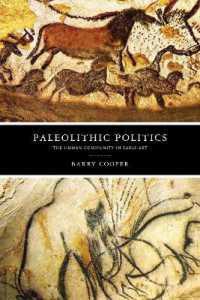- ホーム
- > 洋書
- > 英文書
- > History / World
Full Description
The Clash of Legitimacies makes an innovative contribution to the history of the state-building process in late medieval Lombardy (during the 13th to 15th centuries), by illuminating myriad conflicts attending the legitimacy of power and authority at different levels of society. Through the analysis of the rhetorical forms and linguistic repertoires deployed by the many protagonists (not only the prince, but also the cities, communities, peasants, and political factions) to express their own ideals of shared political life, this volume reveals the depth of the conflicts in which opposing political actors were not only inspired by competing material interests - as in the traditional interpretation to be found in previous historiography - but also often were guided by differing concepts of authority.
From this comes a largely new image of the late medieval and early Renaissance state, one without a monopoly of force - as has been shown in many studies since the 1970s - and one that did not even have the monopoly of legitimacy. The limitations of attempts by governors to present the political principles that inspired their acts as shared and universally recognized are revealed by a historical analysis firmly intent on investigating the existence, in particular territorial or social ambits, of other political cultures which based obedience to authority on different, and frequently original, ideals.
Contents
Introduction
Part I: Towards the commune as state
1: Northern Italy in the central Middle Ages. Some historical background
2: The city commune and the assumption of a public role
3: Experimentation and conceptualisation in the field of urban expansion and the construction of territory
4: The political cultures of the city and the territory: some early affinities
5: Some cornerstones of city and communal ideology
6: Between unitas and aequalitas: the ideology of representation
7: The ideologues of communal political culture
8: The experience of personal government between the factions and the Popolo: the persistence of the commune
9: Towards conflict. The political and juridical culture of the commune becomes hegemonic
10: The political cultures of the contado: aristocratic pre-eminence and the subordination of the rural dweller
11: Rural communes and the culture of practices
Part II: Towards the regional state
1: New scenarios, old questions
2: The rise of Visconti power, between legitimation from below and a longing for majesty
3: The ideology of the regional state
4: Law as a field of tension
5: The duke and the culture of individual distinction
6: The territorial aristocracies: pressure from below, organisation from above
7: The foundations of seigneurial power in the countryside
8: Guelphs and Ghibellines: another idea of legitimacy
9: 'Pacta servanda sunt'. The political culture of contractualism
Concluding notes
Bibliography







